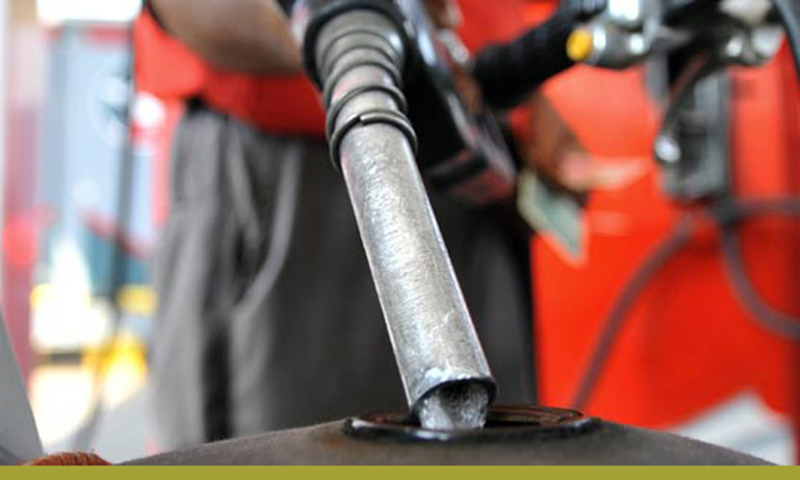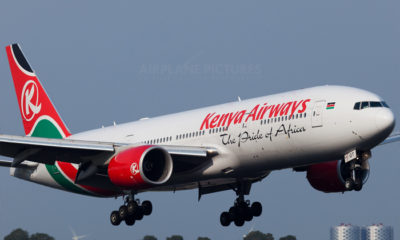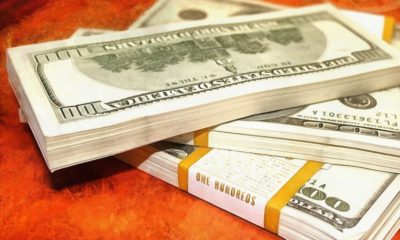Economy
Ascertaining Nigeria’s Petrol Consumption
Published
7 years agoon

- Ascertaining Nigeria’s Petrol Consumption
A recent revelation by the Nigerian National Petroleum Corporation (NNPC) that it spends outrageous amount of money to subsidise the price of 60 million litres of petrol consumed daily in the country has raised a red flag that the country is heading for another unsustainable subsidy regime.
Although the NNPC has adopted a technical name of “under-recovery,” to replace “subsidy,” it is undisputable that under-recovery is the loss incurred by the corporation to ensure that petrol sells for N145 per litre, as against the expected open market price of over N171 per litre.
Under the defunct Petroleum Support Fund (PSF) scheme, which regulated the old subsidy regime, under-recovery sets in when the expected open market price of imported product is less than the official pump price.
The NNPC and private marketers are paid subsidy to offset under-recovery.
In rare cases, “over-recovery” arises when the official pump price is more than the expected open market price as a result of cheap foreign exchange and low cost of product in the international market.
The NNPC and the private marketers are supposed to refund money to the federal government as the excess payment they received by selling at official price that is higher than the importation cost.
By selling product today below the market price, the corporation is actually subsidising the cost for Nigerians, thus it is appropriate to refer to the loss in supplying the product at below market price as subsidy.
The Group Managing Director of NNPC, Dr. Maikanti Baru had reportedly told the Comptroller-General of the Nigerian Customs Service, Col. Hameed Ali (Rtd), that the huge loss was due to the proliferation of filling stations in communities with international land and coastal borders across the country.
Baru had also revealed that detailed study conducted by NNPC indicated strong correlation between the presence of the frontier stations and the activities of fuel smuggling syndicates.
According to him, activities of the smugglers led to the recent abnormal surge in the evacuation of petrol from less than 35 million litres per day to more than 60 milion litres per day.
NNPC’s estimation
In a detailed presentation on the proliferation of filling stations, Baru had revealed that 16 states, which have 61 local government areas with border communities, accounted for 2,201 registered fuel stations.
According to him, the tanks of the facilities had a combined capacity of 144,998,700 litres of petrol.
Baru had also added that eight states with coastal border communities spread across 24 Local Government Areas (LGAs) accounted for 866 registered fuel outlets with combined petrol tank capacity of 73,443,086 litres.
A further breakdown of his presentation showed that among the states with land border, three LGAs in Ogun State accounted for 633 fuel stations with combined petrol tankage of 40,485,000 litres, while nine LGAs in Borno State had 337 fuel outlets with combined petrol storage capacity of 21,114,480 litres.
The NNPC boss had also stated that Lagos with one LGA as border community has 235 registered fuel stations with total storage facility of 19,916,600 litres.
On the coastal front, Lagos with six LGAs led with 487 registered fuel stations with combined in-built storage capacity of 50,239,560 litres.
“Akwa Ibom, with five LGAs, has 134 registered retail outlets with capacity to store 8,322,986 litres; while Ondo State, with two LGAs, has 110 fuel stations with capacity to store 3,871,320 litres,” Baru had reportedly said.
Apparently justifying the outrageous figures of daily consumption in the country, the NNPC boss had also argued that because of the obvious differential in petrol price between Nigeria and other neighbouring countries, it had become lucrative for the smugglers to use the frontier stations as a veritable conduit for the smuggling of products across the border.
He said the development had resulted in a thriving market for Nigerian petrol in Niger Republic, Benin Republic, Cameroon, Chad and Togo, as well as Ghana, which has no direct borders with Nigeria.
“The NNPC is concerned that continued cross-border smuggling of petrol will deny Nigerians the benefit of the Federal Government’s benevolence of keeping a fix retail price of N145 per litre despite the increase in PMS open market price above N171 per litre,” he had added.
Actual consumption estimates
Baru had also admitted that the sudden jump of the country’s consumption from less than 35 million litres per day to over 60 million litres daily was in sharp contrast with established national consumption pattern.
Indeed, a committee on national consumption, which last sat during the administration of former President Olusegun Obasanjo in 2006, had submitted that Nigeria’s daily consumption of petrol was 32 million litres daily.
Downstream operators, who spoke on the current NNPC’s estimates, told journalist at the weekend that the daily consumption estimates of 60 million litres is outragous.
The operators also faulted NNPC’s attempt to use number of filling stations and capacities of their storage tanks to determine the country’s daily petrol consumption.
“In these challenging times, most of the tanks in filling stations and even the depots are always dry. For instance, no depot in Lagos is utilising up to 60 per cent of the capacity of their storage tanks because of the numerous challenges in the sector. In the same vein, most of the tanks in filling stations are not always filled to their capacities. Again, most times, it is not all filling stations that have product in a given day.
So, if Lagos has 100 filling stations with storage tanks of five million litres, it does not mean that Lagos consumes five million litres of petrol daily,” said an independent marketer, who opted not to be quoted.
“This estimate is more disturbing given the fact that NNPC is the sole importer of petrol and can choose to inflate the figures of the daily consumption to justify the huge losses incurred in selling the product for N145,” the independent marketer said.
“The truth is that the country is back to the old subsidy regime. The difference is that it is only the NNPC that now absorbs the losses unlike before when NNPC and private marketers incurred losses, which were refunded by government in subsidy payment. NNPC is now using government money to trade and incur huge losses for the government,” he added.
Another marketer echoed his sentiment, saying that with the NNPC as the sole importer, the current regime is open to more abuse than the old subsidy regime.
“Before this current regime, the PPPRA and DPR issued importation quota and license to the NNPC and the private marketers and none of the participants in the petroleum support fund scheme would exceed the import quota without seeking for fresh approval from the regulatory agencies. But now, it is the only NNPC that imports and also decides the volume it will import. This current regime is open to more abuse because any unscrupulous officials within the NNPC can take advantage of this to make outragous claim,” he explained.
Obviously worried by the conflicting figures being bandied around as the country’s daily demand for petrol, the National Bureau of Statistics (NBS) and the Petroleum Equalisation Fund (PEF) had in July 2017 disclosed that they had commenced investigations to ascertain the actual volume of petrol being consumed in the country daily.
The two agencies had argued that the 35 million litres or 40 million litres daily petrol consumption figures often bandied about as at then by some government establishments were mere estimates.
According to these agencies, the numbers had not helped in adequate planning and making sustainable policies.
Officials of both agencies were drafted into a committee to undertake the task at the PEF headquarters in Abuja, where the Statistician-General of the Federation/Chief Executive of NBS, Dr. Yemi Kale had stressed that some cases of fuel scarcity in the past were due to lack of data on the exact number of petrol consumers across the country.
“This is all about getting data to make decisions. I have said many times that for us to take decisions, whether policy or any other kind of decision, you have to understand what the problem is; you have to know what the data says. The information on what the problem is and how to tackle it lies with data,” Kale reportedly said.
“So, this is our attempt to get accurate data about the actual consumption of petrol by Nigerian consumers. It is only when we know what the consumption of petrol is that we know exactly how much petrol we need in the country. This is because we have had problems in the past when people made assumptions on what this is,” Kale said.
“But this time around, we want to get the actual numbers to help us plan. When we have the actual numbers of petrol consumption today, we can plan what the numbers will be by next year, in five years’ time and so on. When this is done, the issues we had in the past of petrol scarcity and petrol numbers that we are not sure of can become factual. Until we get the actual numbers, it will be difficult to take policy decisions and get actual facts,” Kale added
Also speaking on the country’s daily petrol consumption at the event, the Executive Secretary of PEF, Mr. Ahmed Bobboi, said, “Different agencies have their own figures”.
“But we feel it is embarrassing to us in the same ministry and country for different agencies to be brandishing different figures. And that is the reason why we decided to work collaboratively to be able to get a figure that will be accepted by everybody,” Bobboi added.
As PEF and NBS are working on the correct estimates, the federal government should constitute a committee on national consumption, comprising NNPC, PPPRA, PEF, DPR, NBS, marketers, organised labour, Nigerian Navy and the Nigerian Customs Service, to determine the appropriate volume consumed daily in the country, given the latest outrageous figures being bandied about by the NNPC as the losses incurred to maintain the price of 60 million litres daily at N145 per litre.
Is the CEO and Founder of Investors King Limited. He is a seasoned foreign exchange research analyst and a published author on Yahoo Finance, Business Insider, Nasdaq, Entrepreneur.com, Investorplace, and other prominent platforms. With over two decades of experience in global financial markets, Olukoya is well-recognized in the industry.

You may like
-
Nigeria Considers Creation of 31 New States Despite Economic Challenges
-
Visa Denial Sparks Airport Drama as Kenya Airways Defends Staff
-
Nigeria Seeks $15bn Investment to Revamp Power Sector, Offers Higher Tariffs
-
Nigeria’s Economy Shows Signs of Recovery with December PMI at 51.0
-
Nigeria Joins BRICS as Partner Country, Strengthening Global South Cooperation
-
70 Million Poorest of The Poor Nigerians To Get N75,000 From FG















